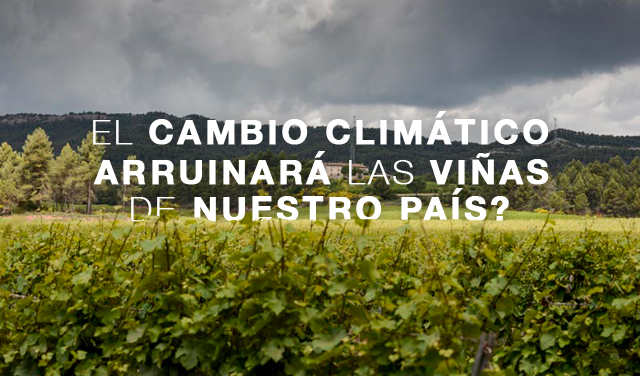Will climate change destroy our country's vineyards?

Climate change is clearly the biggest threat that the entire wine industry, but particularly winegrowing, faces today.
Vitis vinifera is a plant that is extremely sensitive to changes in temperature. Over the past 40 years, we have seen a one-degree increase in temperature in the Penedès that has brought the harvest forward by approximately ten days, depending on the year, compared to twenty years ago. This means we have to adapt. We are changing the way we farm our vineyards to delay grape ripening in order to endure another one-degree increase in temperature. But the worst is yet to come: if temperatures rise 4 to 5 degrees by 2100 as experts predict, it will have disastrous consequences for winegrowing as we know it.
We are not looking at an easy future. In saying that, we are not being pessimistic, but realistic. We will continue making wine, but it is clear that it will be very different. In fact, we believe that the entire map of wine appellations will change completely, not just in Spain, but also across Europe.
Winegrowing will have to adapt to the new climatic circumstances. If possible, vineyards will have to be moved northward or to higher elevations where temperatures are cooler. This is what we have been doing in Catalonia for the past 20 years. We have bought land in the foothills of the Pyrenees at elevations of up to 1200 meters. These days it is still impossible to grow grapes there, but it may represent a great opportunity for certain varieties in the future.
We might also look at replacing certain varieties with others. In some areas, we might grow Monastrell instead of Tempranillo or Tempranillo instead of Pinot Noir or even plant old, revived varieties. Over the past thirty years, we have worked on reviving pre-phylloxera Catalan varieties, and experiments have shown that some of them are more resistant to drought and high temperatures in addition to having enormous enological potential.
Reducing our carbon footprint by 30%
Since 2007, we have invested a lot of time and effort into finding ways to combat climate change and mitigate its effects. Our philosophy has always had an ecological component—our company slogan is "the more we care for the earth, the better our wine." But when I saw Al Gore's documentary An Inconvenient Truth in 2007, it had such an impact on me that we decided to invest 10 million euros in a program called Torres & Earth and set ourselves the goal of reducing our carbon footprint per bottle by 30% by 2020. Our initiatives include using renewable energy, reusing pruning canes and woody residues to fuel our biomass boiler, reducing the weight of our bottles, introducing a solar electric sightseeing train for wine tours, switching to hybrid or electric vehicles, etc.
We are also seeing a growing awareness among consumers who are increasingly seeking out wines produced in a responsible manner that not only considers quality, but also sustainability criteria. What we are talking about is sustainable viticulture, not simply organic farming, because the latter doesn't necessarily contribute to mitigating the impact of climate change. Organic viticulture needs the right kind of climate otherwise it can lead to excessive copper treatments that contaminate the soil. It also doesn't consider maximum CO2 emission limits; one can have an organic vineyard and still pollute a great deal. It would therefore be helpful if organic viticulture also factored in climate change. Avoiding the use of weed killers and insecticides is important, but it is necessary to go a step further and control other aspects of pollution as well.
To ensure the future of our industry, we have to work in a responsible and intelligent manner and produce environmentally friendly products that cut down on the use of tractors, which release harmful CO2 into the atmosphere. We have to find ways of reducing the carbon footprint of our wineries, taking into account every step of the process. Why keep using metal posts in organic vineyards when you could use wooden ones instead? Every piece of wood that we can conserve on our planet is a way of storing carbon, at least for several decades. When working with markets that are further away, say Sweden or Canada, why not bottle the wine upon arrival? This would significantly reduce CO2 emissions.
The need for joint initiatives
Everything adds up and we have a lot of different options, but we need to work together to build and promote joint initiatives like Wineries for Climate Protection (WCP), for example. Compared to projects aimed at creating sustainable regions, this one is far broader and more ambitious in scope. It seeks a significant reduction in the industry's carbon footprint and demands a real commitment from member wineries: to reduce their CO2 emissions per bottle by 20% by the year 2020.
The project began in Spain three years ago with the goal of getting every winery that is concerned about climate change to participate. The first symposium took place in Barcelona in June 2011 and was attended by Mr. Ricardo Lagos, the UN Special Envoy for Climate Change. Since then the project has worked on a procedure to approve actions implemented by companies and carry out effective audits in the three areas of the production process: winegrowing, winemaking and distribution. We expect WCP to be fully operational by the end of 2014.
We have clearly arrived at a crucial moment in which the future of coming generations is at stake. We need to become aware of the devastating impact of climate change and take action. We have to change the way we live as individuals, as a society and as an industry. Our economic model, based on immediate profits at any price, has to give way to a more universal and humanist view of development, which requires a different, multifaceted perspective on progress, welfare, health and the world we will leave to our children. Greenhouse gases are clearly responsible for the fast, continual rise in temperature that began with the advent of industrialization. Fast and devastating if we pause to consider that the previous significant increase in temperature—a total of 6 degrees—happened 55 million years ago and over a period of 20,000 years.
Miguel A. Torres, President Of Bodegas Torres
Article published at La Vanguardia Digital
Journalist: Joaquim Elcacho
